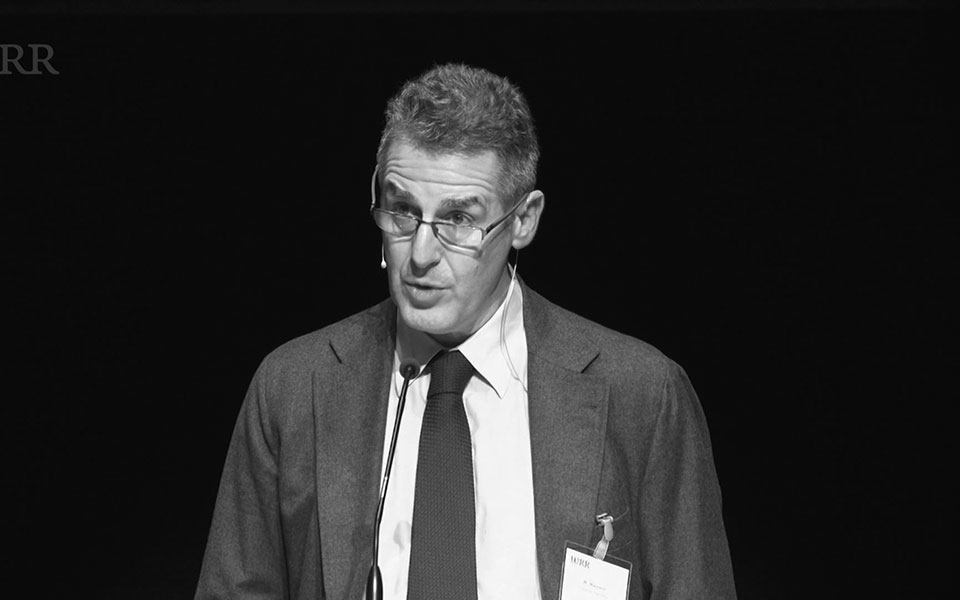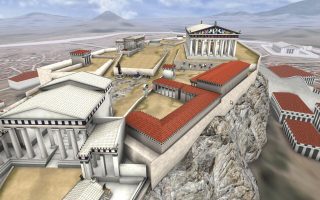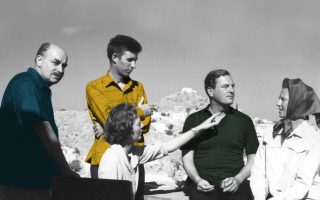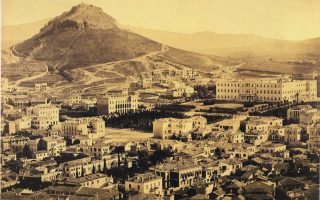‘History is, above all, an exercise in imagination,’ Mazower tells Kathimerini

“I was in the bookshop the other day and I saw your book and realized that you must be the son of Bill Mazower, who was my first boyfriend in Minehead, Somerset in 1941,” declares one of several letters Mark Mazower has received since the publication last year of his book “What You Did Not Tell.”
The writer of that letter was 14 years old in 1941 and the distinguished British historian’s father was 16. It was World War II and, like thousands of other Londoners, he had been evacuated from the city to the countryside, where the romance occurred.
The book must have given the reader incredible insight into Bill’s family history – about his father Max and the active role he played in the Russian Revolution, about his emigration to Britain and how he started his family, but also about Bill’s half-brother, about his unreachable utopias, his dreams and defeats, and his adaptation to a changing world – much of which he didn’t know himself.
It’s amazing how we’re shaped by history, Mazower told Kathimerini in a recent interview during a visit to Greece.
“I wanted to talk about how history shapes us, how we are formed by historical forces,” he says. “The reason we can’t normally do that as historians is because we don’t know an individual’s personality well enough.” Unless, of course, they are writing about family.
As he started digging into his father’s past, Mazower soon realized that he needed to go deeper, to look into the life of his grandfather Max, “a silent man.”
One of the surprises he came across was his family’s complicated relationship with Nikolai Krylenko, the notorious Soviet commissar of justice who persecuted dissidents and was eventually executed as one himself during Stalin’s purges.
Krylenko’s sister, Sofia, had had a child with Max before he left Russia. The child, Andre, grew up with Max’s new family in Britain. However, he turned against his father’s left-wing principles and moved to Franco’s Spain, where he became a Catholic and a neofascist.
Max’s ability to keep a secret was also evident in the fact that he never told his wife the name of his mother, even though she had died when he was 14 years old. His grandfather’s overall stance is in fact very much at the heart of Mazower’s book, as the historian questions whether Max’s silence was a good or bad thing.
“If you were in his position and your dreams had been disappointed and you moved away to make your home in another country and the most important thing for you is your children, silence could actually have a positive effect,” says Mazower.
“Silence was a way saying to the children, ‘You are free, you can inquire about my past if you want, or you can go off in your own direction.’”
The young sweethearts from 1941 never saw each other again after the war, but Mazower met the writer of the letter, who was in her 90s at the time, and felt closer to his father as a result. “I suddenly saw him as a 16-year-old boy,” he says.
Bill Mazower died in 2009 and never got a chance to see his son’s research into the family history, which went much deeper than Bill could possibly have known.
“It’s a strange feeling,” says Mazower. “In a way he is the person I was writing the book for.”
“I’m on a mission to tell everybody to do what I did 20 years ago. I spent several days with him with a tape recorder and got him to talk. At that time I did nothing with those recordings, but I was glad later that I made them. I would advise everybody to do the same. It’s cheaper than psychotherapy.”
Another issue addressed in the book is the social mobility seen in Britain in the 1920s and 30s, which allowed the Mazower family – Russian Jews with an intense political background – to move up through the social strata.
When Bill was born, Max was running a company in Sheffield that exported factory parts, and Mark’s father went on to receive a British education like any other English youngster. Things are very different today.
“We turned our back on [social mobility] first in England and then in Europe and around the world. Social mobility has decreased and the EU, which at one point [worked in favor of social mobility] through the regional mobility funds and so on, instead became increasingly identified with the creation of the euro and a defense of a stable currency and austerity,” says Mazower.
“The imposition of austerity made the problem with social mobility worse, and so we now have the social crisis, one of the many reasons for euroskepticism.”
Europe’s biggest challenges right now, says the historian, are social issues. “Greece has been stuck in this torture for nearly eight years now as a result of the identification of Europe with the defense of the euro, the currency, and I think it’s an obscene situation. I don’t say there would be a better solution for Greece, because Greece is powerless, but I do think that the EU is going to find itself in much more of a crisis in the years ahead if it doesn’t switch its attention back to social issues,” he stresses.
Last year, Mazower founded Columbia University’s Institute for Ideas and Imagination, of which he is also director. Based in Paris, the institute brings together notable historians and scientists with artists and other creative people.
“History is, above all, an exercise in imagination,” says Mazower. “It’s an exercise in imagination based on facts, which is why it’s not novel writing, but it’s absolutely an exercise in imagination, and without imagination the history people write is pretty dull.”
“The public appetite for history remains very strong,” he adds. “Especially now when the political signposts are unfamiliar and there is a sense of things moving in an uncertain direction and they want to read more history.”
Talk of history and silence brings us to the question of whether countries should remain quiet or not about their own histories and challenges. “I think it’s a very good thing that Germany, for instance, has this long history from 1945 of grappling with its past,” says Mazower, stressing that scale is an important factor.
“It’s a question of how you are attached to the past. It’s what you are using the past for, in what spirit, what tone of voice,” the historian says, adding that the example of the name dispute between Greece and the Former Yugoslav Republic of Macedonia illustrates how “you can be proud of the past and it doesn’t commit you to any particular position.”
“Everybody on all sides is busy pointing to the past, Alexander the Great here, Ilinden there, and you have these kind of pseudo-historical discussions going on. I see nothing wrong in thinking seriously about the past, not least because when people think seriously about the past it doesn’t usually lend itself to this kind of simplistic, nationalist propaganda.”
In terms of the agreement reached between the two sides, Mazower, who has studied and written about Greek history, says that an agreement is “very desirable” as it has been “holding up progress in the region.”
“I’m hopeful that an agreement along the lines of that which was announced the other day will end this,” he adds. “I think the use of this issue on both sides for internal propaganda has held both countries back.”





